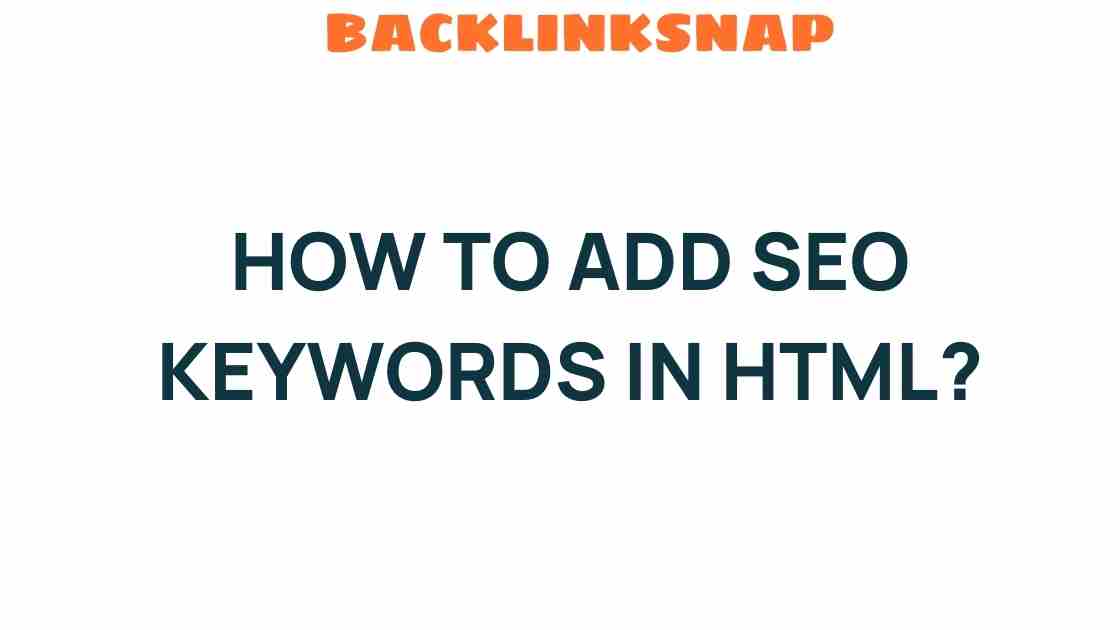Mastering SEO Keywords in HTML: A Guide to Enhance Visibility
When it comes to enhancing your website’s visibility, mastering SEO keywords is crucial. In the digital landscape, where competition is fierce, understanding how to effectively use HTML optimization can give your site the edge it needs. In this article, we’ll explore how to leverage meta tags, strategically place keywords, and implement HTML best practices to improve your search engine ranking and overall on-page SEO.
Understanding SEO Keywords
SEO keywords are the terms and phrases that users type into search engines when seeking information. By incorporating these keywords into your website’s content, you can significantly improve your chances of ranking higher in search results. But it’s not just about stuffing your content with keywords; it’s about using them smartly and ethically.
HTML Optimization for SEO
HTML optimization is the process of refining your HTML code to enhance your website’s performance in search results. This includes using meta tags, optimizing images, and ensuring that your site is mobile-friendly. Here are some key areas to focus on:
- Title Tag: This is the first thing search engines see. It should include your primary keyword and be compelling enough to entice users to click.
- Meta Description: This short summary should also include your primary keyword and provide a clear idea of what your page is about. It’s vital for click-through rates.
- Header Tags: Use headers (H1, H2, H3) to structure your content. Your primary keyword should appear in at least one of these tags, preferably H1 or H2.
Keyword Placement Strategies
Effective keyword placement is essential for optimizing your page. Here are some best practices:
- Early Placement: Try to place your primary keyword within the first 100 words of your content. This signals to search engines that your content is relevant to the user’s query.
- Natural Flow: Avoid keyword stuffing. Instead, aim for a natural flow of language that engages readers while also appealing to search engines.
- Synonyms and Related Terms: Use variations and synonyms of your keywords to enhance relevance without sounding repetitive.
On-Page SEO: The Role of Content Strategy
On-page SEO is all about optimizing individual pages to rank higher and earn more relevant traffic. A robust content strategy plays a pivotal role here. Here’s how to approach your content:
- Quality Content: Ensure your content is informative, engaging, and valuable to your audience. Quality matters more than quantity.
- Regular Updates: Keep your content fresh and updated. Search engines favor sites that regularly publish new information.
- Internal Linking: Use internal links to guide readers to other relevant content on your site, which can help improve your SEO.
Utilizing Meta Tags Effectively
Meta tags are snippets of text that describe a webpage’s content. They don’t appear on the page itself but are crucial for search engines. Here’s how to optimize them:
- Title Tags: Use unique title tags for each page, incorporating your focus keyword.
- Meta Descriptions: Write compelling meta descriptions that include your keywords and encourage clicks.
- Alt Attributes: Don’t forget to use alt attributes for images, including relevant keywords to describe the images succinctly.
HTML Best Practices for SEO
Following HTML best practices not only improves SEO but also enhances user experience. Here are some tips:
- Clean Code: Ensure your HTML is clean and free from unnecessary code. This helps search engines crawl your site more efficiently.
- Mobile Responsiveness: With a significant amount of traffic coming from mobile devices, ensure your site is mobile-friendly.
- Site Speed: Optimize your site for speed, as slow-loading pages can negatively impact your search rank.
Measuring Your Success
Once you’ve implemented these strategies, it’s important to measure your success. Tools like Google Analytics and Google Search Console can provide insights into how well your pages are performing. Monitor your keyword rankings, traffic sources, and user engagement metrics to continually refine your approach.
FAQs About SEO Keywords and HTML Optimization
1. What are SEO keywords?
SEO keywords are specific words and phrases that users enter into search engines to find information. They are essential for optimizing your content to match user intent.
2. How can I find the right keywords for my site?
You can use tools like Google Keyword Planner, SEMrush, or Ahrefs to identify relevant keywords with good search volume and manageable competition.
3. How often should I update my content?
Regular updates are beneficial. Aim to refresh your content at least every few months to keep it relevant and accurate.
Meta tags help search engines understand the content of your page. They play a crucial role in click-through rates and overall visibility in search results.
5. Can I use the same keywords on multiple pages?
While it’s possible, it’s better to focus on unique keywords for each page to avoid competition between your own pages for the same search terms.
6. How long should my meta descriptions be?
Meta descriptions should typically be between 150-160 characters to ensure they are fully displayed in search results.
Conclusion
Mastering SEO keywords in HTML is an ongoing process that combines technical knowledge with creative content strategy. By focusing on HTML optimization, effective keyword placement, and adhering to on-page SEO best practices, you can significantly enhance your website’s visibility and search engine ranking. Remember, SEO is not just a one-time effort; it requires continuous improvement and adaptation to changing algorithms and user behaviors. Start implementing these strategies today, and watch your online presence thrive.
For a deeper dive into SEO strategies, check out this comprehensive guide on SEO best practices. Additionally, for the latest trends in website optimization, visit Moz’s SEO blog.
“`
This article is in the category SEO Optimization and created by BacklinkSnap Team




